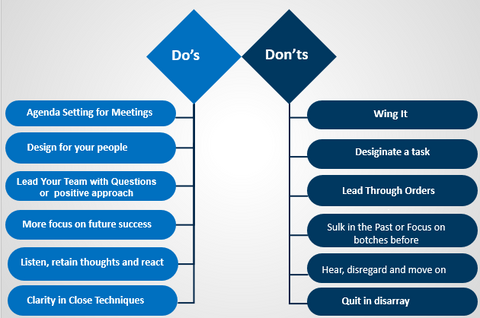Know The 3 things That Can Ruin Your Lessons Learned Meeting And 3 things That Won't
How Do I Run A Lessons Learned Meeting
Project managers have a lot on their plate, so organizing a lessons learned meeting isn't always the most important task. However, this is an essential step in any project's lifespan that should not be overlooked. In this blog post, we will discuss how to organize and run your lessons learned meeting from start to finish.

How To Conduct Lessons Learned Meeting In Project Management?
The purpose of the meeting is to evaluate what went well and what did not go so well in a project. It's also an opportunity for you to learn about how your team would like future projects managed differently, if at all.
This meeting should be scheduled before the end of the project but must take place within 90 days of the project's completion.
The meeting should be attended by as many stakeholders and team members that are possible but can also include people who were not originally on the project to hear their thoughts. It is important for all perspectives to be heard in this type of meeting because it's an opportunity for you and your company to grow from past mistakes or successes.
In general, there are a few don'ts when organizing lessons learned meeting: You must carefully prepare what will happen during the meeting; make sure everyone that needs to attend knows about the project background and is briefed on the meeting agenda and be aware of what questions are appropriate to ask during the lessons learned meeting.
The do's for a successful lesson learned meeting include: create an organized format that will guide people through each section of questions being asked, make sure participants feel comfortable in asking questions if they don't know anything about it, taking notes is important because you'll need them later when reporting your findings back to management or other stakeholders.
It is also recommended to have someone take photos and record the meeting so those who weren't able to attend can hear or view everything that happened at their own convenience.

6 Dos And Don’ts For Effective Lessons Learned Meetings
1. Set an agenda for the meeting :
The agenda should include the meeting's objectives, who is in charge of leading the meeting, and what are their qualifications. This way people know ahead of time what to expect from the meeting and will be prepared with questions or topics they want to discuss. If you're not sure about setting a format for your lesson learned meetings, there are many templates available on google that can help out!
Do: create an organized format that will guide people through each section of Qs being asked
Don't: forget how important it is to take notes because you'll need them later when reporting findings back to management or other stakeholders. It also recommended having someone record and/or taking photos so those who couldn't attend could hear or view everything
2. Don't talk too much or interrupt others:
Give everyone a chance to present their feedback about the project. It is important to keep the conversation going and to maintain a high level of engagement
Do: take turns with other people in your lessons learned meeting. It is important that each person get their fair chance to offer feedback about what they observed or experienced during the project.
Don't: Assume you know how others feel without hearing them out first, this could lead to miscommunication which will cause friction between different stakeholders who should be working together for better outcomes all around
Keep these tips in mind so you can have productive and insightful lesson learned meetings!
3. Do try to keep your tone neutral and not emotional it is important :
you are not biased as this could lead to miscommunication. You should not be biased as this could lead to miscommunication.
Do: take turns with other people in your lessons learned meeting. It is important that each person get their fair chance to offer feedback about what they observed or experienced during the project.
Don't: Assume you know how others feel without hearing them out first, this could lead to miscommunication which will cause friction between different stakeholders who should be working together for better outcomes all around
Keep these tips in mind so you can have productive and insightful lesson learned meetings!
4. Don't make assumptions about what other people are thinking or feeling :
It is best to make sure before you assume about a person's thoughts and feelings.
Do not assume you know how others feel without hearing them out first, this could lead to miscommunication which will cause friction between different stakeholders who should be working together for better outcomes all around
Keep these tips in mind so you can have productive and insightful lesson learned meetings!
The key is taking turns with other people in your lessons learned meeting. It's important that each person gets their fair chance to offer feedback about what they observed or experienced during the project - ideally everyone takes a turn before the discussion begins. If there are only two people at the table, discuss one topic before switching topics. Also, make sure that no one dominates the conversation by cutting off speakers when it isn't their turn:
5. Do take notes on everything that is said in the meeting :
It will help you remember later when you're trying to recall specific details about someone's comments in the meeting.
One more thing to remember is that everyone's feedback can be valuable. While some suggestions may seem like common sense, others could point out a problem you otherwise would not have been aware of - either way, it will help you and your team improve in the future!
The key is taking turns with other people in your lessons learned meeting. It's important that each person gets their fair chance to offer feedback about what they observed or experienced during the project - ideally everyone takes a turn before the discussion begins. If there are only two people at the table, discuss one topic before switching topics.
6. Don't get defensive :
If someone says something you don't agree with, just let them speak their mind and then respond accordingly when they finish talking and they will respect you for it.
“The Do's and Don'ts of Lessons Learned Meetings" The key is taking turns with other people in your lessons learned meeting. It's important that each person gets their fair chance to offer feedback about what they observed or experienced during the project - ideally everyone takes a turn before the discussion begins. If there are only two people at the table, discuss one topic before switching topics.
Don't get defensive if someone says something you don't agree with, just let them speak their mind and then respond accordingly when they finish talking and they will respect you for it."



